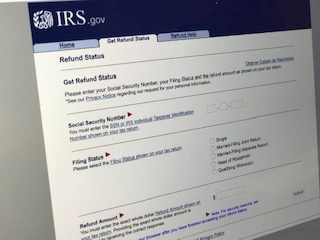As the April tax filing deadline approaches, the Internal Revenue Service is warning of identity theft. Bill Moak a Consumer Awareness Expert and Communications Chair at Belhaven University says scammers are stealing people’s refunds by stealing their identities and filing their taxes.
“There’s a lot of theft going on of basically people hijacking the refund,” said Moak. “This started happening in earnest about three-four years ago. What they do is they will get your social security number and then they will file a tax return in your name. They will then get the refund sent to them so, by the time you get ready to file your taxes, the IRS says wait a minute, you’ve already filed a return. You have to jump through all kinds of hoops and report it, but they’ve made off with the refund that should have gone to you.”
Despite a steep drop in tax-related identity theft in recent years, the IRS says the scam remains serious enough to earn a spot on the agency’s 2019 “Dirty Dozen” list of tax scams.
“Taxpayers should continue to protect their sensitive tax and financial data to help protect against identity thieves,” IRS Commissioner Chuck Rettig said. “The IRS and the Security Summit partners in the states and the private sector have joined forces to improve our defenses against tax-related identity theft, sharply reducing the number of victims. But we encourage taxpayers to continue to be on the lookout for identity theft schemes, including email phishing attempts and other tax scams.”
Tax-related identity theft occurs when someone uses a stolen Social Security number or Individual Taxpayer Identification Number (ITIN) to file a fraudulent tax return claiming a refund.
Taxpayers should remember that identity thieves constantly strive to find a scheme that works. Once their ruse begins to fail as taxpayers become aware of their ploys, they change tactics. Taxpayers and tax professionals must remain vigilant to the various scams and schemes used for data thefts. Business filers should be aware that cyber criminals also file fraudulent Forms 1120, U.S. Corporate Income Tax Return, using stolen business identities and they, too, should be alert.
Taxpayers and tax professionals should:
- Always use security software with firewall and antivirus protection. Make sure security software is turned on and can automatically update. Encrypt sensitive files such as tax records stored on the computer. Use strong passwords.
- Learn to recognize and avoid phishing emails and threatening phone calls and texts from thieves posing as legitimate organizations such as banks, credit card companies and government organizations, including the IRS. Do not click on links or download attachments from unknown or suspicious emails. Invest in good anti-spyware and anti-malware software protection.
- Protect personal data. Don’t routinely carry a Social Security card, and make sure tax records are secure. Treat personal information like cash; don’t leave it lying around.
The Security Summit has worked to increase awareness among taxpayers and tax professionals about tax-related identity theft and security steps through its “Taxes. Security. Together.” and “Protect Your Clients; Protect Yourself” campaigns.
Reversing the damage caused by identity theft is often a frustrating and complex process for victims. While identity thieves steal information from sources outside the tax system, the IRS is often the first to inform a victim that identity theft has occurred. The IRS is working diligently to resolve identity theft cases quickly. For more information, see the special identity theft section on IRS.gov.




